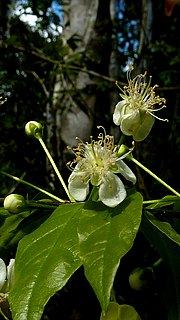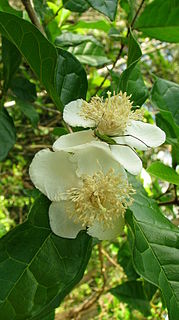
Campomanesia is a genus in the family Myrtaceae described as a genus in 1794. It is native to South America and Trinidad.

The crested fireback is a medium-sized, up to 70 cm long, forest pheasant with a peacock-like dark crest, bluish black plumage, reddish brown rump, black outer tail feathers, red iris and bare blue facial skin. The female is a brown bird with short crest, blue facial skin and spotted black-and-white below.

The rufous owl, also known as the rufous boobook, is a species of owl in the family Strigidae. It was described in 1846 by John Gould, an English ornithologist. Its common name reflects the rufous-coloured feathers that these owls are covered with in adulthood. While it is uncommon, the species has a wide range, including Australia, Indonesia, and Papua New Guinea.

The red-chested flufftail is a species of bird in the family Sarothruridae. It is found in sub-Saharan Africa from Liberia to Ethiopia and south to South Africa.

The rusty-backed antwren is a species of bird in the family Thamnophilidae. It is found in Bolivia, Brazil, Paraguay, Peru, and Suriname. Its natural habitats are subtropical or tropical dry shrubland, subtropical or tropical seasonally wet or flooded lowland grassland, and heavily degraded former forest.
Ardisia rufa is a species of plant in the family Primulaceae. It is endemic to Panama. It is threatened by habitat loss.

Campomanesia aromatica is a species of plant in the family Myrtaceae. The plant is endemic to the Atlantic Forest ecoregion in southeastern Brazil.
Campomanesia espiritosantensis is a species of plant in the family Myrtaceae. The plant is endemic to southeastern Brazil, including in the Atlantic Forest ecoregion.
Campomanesia hirsuta is a species of plant in the family Myrtaceae. The plant is endemic to the Atlantic Forest ecoregion of southeastern Brazil, within Rio de Janeiro state. It is an IUCN Red List Endangered species, threatened by habitat loss.
Campomanesia laurifolia is a species of plant in the myrtle family, Myrtaceae. It is endemic to Atlantic Forest habitats in Rio de Janeiro state of southeastern Brazil. It is a Critically endangered species on the IUCN Red List, and is threatened by habitat loss.
Campomanesia lundiana, also known as the Rio de Janeiro myrtle, was a species of plant in the family Myrtaceae. Before modern extinction, the plant was endemic to Rio de Janeiro state, within the Atlantic Forest ecoregion in southeastern Brazil.
Campomanesia neriiflora is a species of plant in the family Myrtaceae. It is endemic to Brazil. It is threatened by habitat loss.

Campomanesia phaea is a species of plant in the family Myrtaceae. The plant is endemic to the Atlantic Forest ecoregion in southeastern Brazil. It is found in the states of Paraná, Rio de Janeiro, São Paulo.
Campomanesia prosthecesepala is a species of plant in the family Myrtaceae. The plant is endemic to the Atlantic Forest ecoregion in southeastern Brazil, within Minas Gerais state.
Campomanesia reitziana is a species of plant in the family Myrtaceae. It is endemic to Brazil. It is threatened by habitat loss.
Campomanesia speciosa is a species of plant in the family Myrtaceae. It is endemic to the Amazon basin in eastern Peru and Acre (state) of Brazil. It is threatened by habitat loss.

Campomanesia ilhoensis is a species of plant in the family Myrtaceae.
Knema rufa is a species of plant in the family Myristicaceae. It is a tree endemic to Borneo.
Madhuca rufa is a species of plant in the family Sapotaceae. It is a tree endemic to Peninsular Malaysia. It is threatened by habitat loss.
Diospyros rufa is a tree in the family Ebenaceae. It grows up to 30 metres (100 ft) tall. Twigs are reddish when young. Inflorescences bear up to 10 flowers. The fruits are round to ellipsoid, up to 3.5 cm (1 in) in diameter. The specific epithet rufa is from the Latin meaning "reddish", referring to the indumentum of the young twigs. Habitat is lowland mixed dipterocarp forests. D. rufa is found in Peninsular Malaysia and Borneo.








